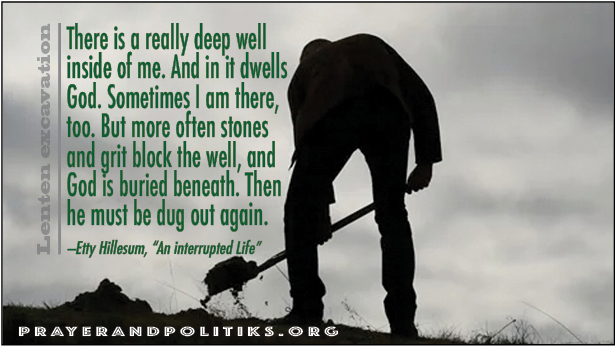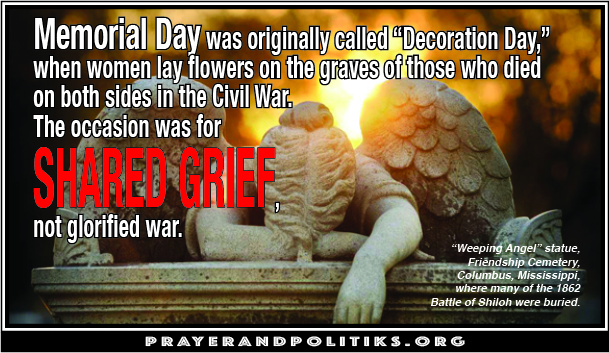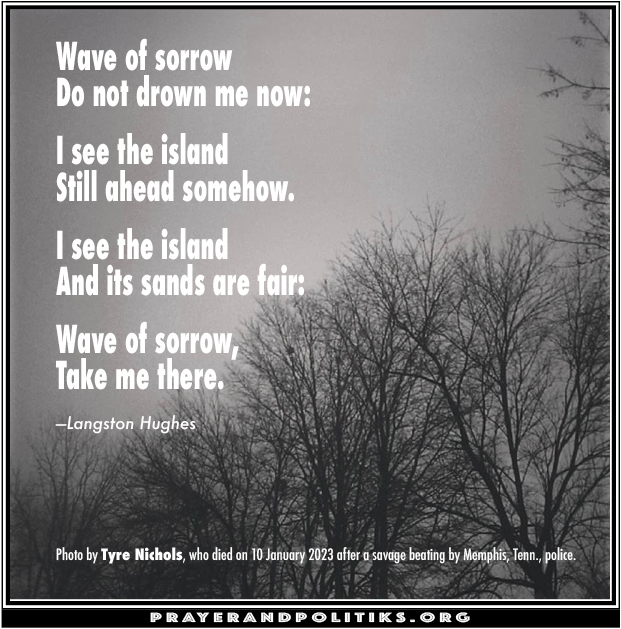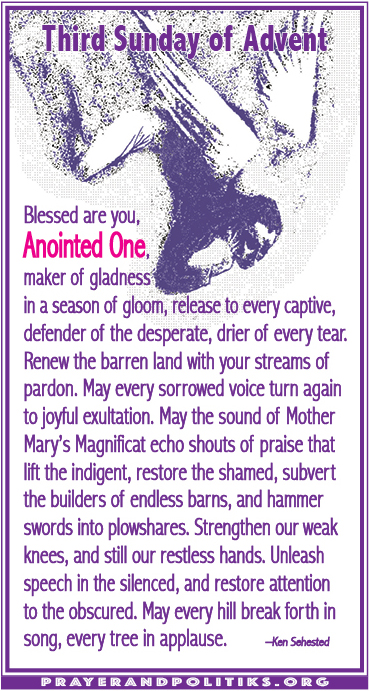Giving your heart to Jesus will make you odd
Ken Sehested
Invocation. “Give Me a Clean Heart.” —James Cleveland & the Southern California Community Choir
§ § §
“Lord, I’ve made you a place in my heart, and I hope now you leave it alone.”
—Greg Brown, performed by Dar Williams, Richard Shindell and Lucy Kaplansky
This coming Sunday’s lections include two verses with recognizable Lenten notes: “Create in me a clean heart, O God” from Psalm 51 and the promise of the Almighty, in Jeremiah 31, of a mandate not just carved in stone tablets but actually written on the human heart, so indelibly that no one will ever again need to proclaim “Know the Lord” for all, from the least to the greatest, already have this inscribed on their hearts.
No more sermons, books, devotionals, or even hymns—save the everlasting anthems of praise that inevitably rise like moist, salted flour with the addition of yeast.
“Religion of the heart” has a decidedly evangelical Protestant ring to it, evoking the perorations of revivalism, with emotionally fraught, closing hymns of “invitation,” the come-to-Jesus rite. (In commerce, the concluding bargaining includes emotional manipulation called “sealing the deal.” While watching television with my then-four-year-old, after a used car commercial she innocently asked, “Daddy, was that a preacher?”)
Though soaked in this religious environment from children through adolescence, I’ve jettisoned most vestiges of “evangelical” culture, which now has become almost synonymous with White/Christian nationalism. Even when this cancerous growth has not appeared, evangelical piety has turned in on itself. The truth of that traditional spiritual holds: “I want Jesus to walk with me” is a powerful invocation. But often the comfort provided is little more than that of a favorite teddy bear to a small child. Hearts are severed from hands and feet. The circuitry of this piety has largely failed. There is no consideration of Jesus’ response in kind, “Come walk with me.”
As Clarence Jordan said in his inimitable way, “We’ll worship the hind legs off Jesus and never do anything he says.”
Besides enduring love for some of the old hymns of my rearing, there’s this compelling disclosure of life lived in the Spirit: Faith is indeed a matter of the heart; that a transformation “from within” is essential, a conversion which cannot be affected by creedal conformity, emotional intensity, or even moral rectitude.
One of my favorite lines from contemporary music comes from the Greg Brown: “Lord, I’ve made you a place in my heart, and I hope now you leave it alone.” In most of what passes for spirituality in our time—whether it’s the old-fashioned type of piety or the newer-age variety (and there are some stunning similarities)—there is a radical disconnect between religion of the heart and life in the flesh. A lot of people—when they talk about “giving your heart to Jesus” (a phrase found nowhere in Scripture)—what they mean is having a religious experience tinged with certain kinds of emotion and articulated with certain formulaic language.
As Robert McAfee Brown has written, attempts to separate personal faith from public policy “have been front and center ever since Pharaoh unsuccessfully tried to persuade Moses that religion had nothing to do with Egypt’s domestic policy on the status of nonindentured servants.”
In times past, the evangelical impulse in multiple Christian traditions was a reaction against stifling liturgical protocol, constrictive dogma and calcified creedalism, narrowly restrictive moralism, or despotic church hierarchy.
That impulse functioned, for a time (long since passed), in a way not unlike what New Testament scholar Walter Wink articulated nearly 50 years ago in “How I Have Been Snagged by the Seat of My Pants While Reading the Bible.” That short essay was the opening salvo of his debate with the scholarly biblical guild’s overconfidence in the historical-critical method of study because of the way it completely objectified the text and did not allow “the exegesis [study] of the exegete [student].”
His two major complaints were about “objectivism” and “the ideology of individualism, the flawed humanism of the Enlightenment, and an interpretation of Christianity which resolutely avoids addressing the principalities and powers” [the transpersonal forces that shape the way we see in the world in ways of which we are not conscious].
Interrogating the text is needed; but we also must allow ourselves to be interrogated by the text. The question of faith—or no—demands a concrete response from us. The choice of faith involves being “snagged by the seat of our pants.”
One of the unfortunate aftershocks of the Enlightenment has been the assignment of the human heart as the metaphor of emotion, so that the heart is now the fickle organ, susceptible to mood changes: frivolous, irresolute, pliable. Sentimental faith is like cotton candy. Coming at you, it looks huge; but it’s most air, and what substance there is will rot your teeth.
Truth is, that older evangelical impulse was on to something important. The walk of faith entails a profound rearrangement of how the world (and our place in it) is perceived. It requires metanoia, a significant directional change—not just of emotions or cognitive assent to doctrinal formulation or pious posture, but a retooling of the desires and convictions that shape and drive patterns of behavior.
§ § §
Hymn of aspiration. “Give Me a Clean Heart.” —Merlon Devine, saxophone jazz instrumental, inspired by Psalm 51
§ § §
In the Bible, the provenance of the “heart” is that capacity to make determinative and sustainable decisions. The heart is actually the Supreme Court of an individual’s character. It receives data and opinion from all the senses and cognitive activity, then makes a binding decision. This is what Jesus was getting at when he said “You must be born again” (born from “above,” not from the place beyond the sky but from a radically different frame of reference and valuation). The Apostle Paul was pointing to this same truth when he urged “Do not be conformed to this age, but be transformed by the renewing of the mind. . .” (Romans 12:2).
People with little or no religious sensibility understand this requirement. Angela Davis, the Marxist and feminist political activist and author, wrote: “We have to talk about liberating minds as well as liberating society.” In contemporary terms, this “renewing of the mind” process as deconstruction. The “world” (which is not the same as the Earth) is a complex web of warped and destructive desires that distort Creation’s intent for flourishing life of both adam (humanity) and adamah (soil, land). But something has gone terribly wrong. As the early Genesis text declares, “Now the earth was corrupt in God’s sight, and the earth was filled with violence” (6:11).
Spiritual corruption and physical violence are mirror images. Professed faith that does not address the disordering of material life is a sham, a show, a masquerade, yet one more way to evade life lived in the Spirit. The devil, as has been said, does some of his best work in the halls of peppy religious piety.
To further illustrate the point of reference of transformed hearts to corporeal conditions, consider these three key metaphors in Scripture.
The Bible has two different pivotal images or metaphors for material reality, horses and houses.
For ancient Israel, “horses” represented military might and prowess. One could even say that horses were as strategically important in ancient times as tanks were in World War II. Time after time Israel was seduced away from trust in Yahweh God to a national policy of “peace through strength.” Listen to a few of the relevant texts:
Isaiah warns: “Woe to those who go down to Egypt for help and rely on horses, who trust in chariots because they are many, but do not look to the Holy One of Israel” (31:1). (See also Psalm 20:7 and 33:16-17; and Hosea 1:7.)
Here’s a paraphrase for modern ears: “I will not deliver them by Trident submarines, nor by Cruise or Pershing missiles, not by strategic defense initiatives or covert operations, not even by doctrines of full-spectrum dominance.”*
Where “horses” for Israel represented military readiness, “houses” on the other hand was the metaphor for economic strength, for an expanding foreign market and resource extraction, for increased productivity and consumer purchasing power, Wall Street gains, and a larger Gross National Product.
Isaiah pronounces this verdict: “. . . the Lord looked for justice, but behold, bloodshed; for righteousness, but behold a cry! Woe to those who join house to house, who add field to field, until there is no more room, and you are made to dwell alone in the midst of the land” (5:7-8). (See also Amos 5:11; Matthew 23:14; and Acts 4:34.)
In Hebrew thinking, the heart is the deepest level of a human personality, representing the true picture of the person. The Latin word credo, from which we get the word “creed,” comes from two words which together mean “I give my heart to.” Listen to these texts:
Ezekiel gives voice to God’s word: “And I will give them one heart, and put a new spirit within them; I will take the stony heart out of their flesh and give them a heart of flesh, that they may walk in my statutes and keep my ordinances” (11:19-20). (See also Psalm 112:5-9; Jeremiah 31:31-34; Matthew 6:21; Acts 4:32.)
The point of comparing these three biblical metaphors is to illustrate the fact that decisions about horses and houses are made in the human heart. The Reign of God is rightly said to be about human hearts, because it is in the human heart that choices are made about ultimate trust and security.
Jesus’ concise statement in Matthew, on the relation between hearts and treasures, is stark: The heart’s GPS is tracked relative to treasure (where we typically reverse such ordering!). Flesh’s positioning determines the heart’s location: its loyalties, presumptions, and fields of vision.
If other words, treasury decisions are not merely social or political choices. They are, at bottom, spiritual conclusions. Whether of a single household, a local congregation, or a nation-state, budgets are moral documents.
In biblical terms, therefore, giving one’s “heart” to Jesus is in fact the most subversive, world-threatening thing that can happen to a person in a world configured in such a way that might makes right; that only the strong survive; that you make what you earn and keep what you can.
As has been said, you shall know the truth, and the truth will make you odd.
The 5th century BCE Greek historian Thuycydides sums up such worldly assumptions on a larger scale when he wrote in his History of the Peloponnesian War: “. . . the strong do what they can and the weak suffer what they must.”
Contrary to what we are taught by the world’s sway, the garment of faith is woven with intertwined fibers: hearts open to the portal of God’s mercy, formed and informed by eyes and ears compassionately attuned to human misery. According to Jeremiah, the occasion of praise “to the Lord” is triggered by the delivery of the needy from the hands of evildoers (20:13).
The longing for a clean heart is our Lenten overture. Cleaning requires some scrubbing. None of our hearts are spared the clutter and grime of a world where the arrogant heedlessly pursue their exploitation of the meek. According to the gospel of the market, there are “makers” and there are “takers.” The former are to be privileged in public policy; the latter, left to benign neglect.
This is why Lent has its scouring agents: prayer, the intensive quieting of the body and mind in order to hear the Word that transcends the world’s cacophony; fasting, a conscious check on the intrusion of destructive habits and twisted desires; and almsgiving, testifying to the conviction that mutual security—especially in regard to the vulnerable neighbor—is the only lasting security.
Lent’s scouring, its deconstruction and decolonizing scrubbing, is not an undertaking to prove ourselves worthy in God’s eyes, nor a ransom to secure Heaven’s endorsement amid Earth’s rivalries. Rather, scouring stems from the recognition that our hearts have grown cold to the Affection which has pledged to make all things new.
Pilgrim, neither hide nor despise your oddness. Jesus is not going to leave your heart alone. Though sorrow now marks our days, though tears linger through the night, Joy is coming in the morning (Psalm 30:5), when mourning’s sigh will be silenced.
§ § §
Benediction. “Miserere Mei Deus” (God have mercy on me), Psalm 51 set to music in 1630 by Gregorio Allegri, performed her by The Sixteen.
# # #
*Full-spectrum dominance is the official defense policy of the United States. It includes dominance in space-based weaponry in addition to land, sea and sky, as well as cyber warfare. As early as April 2001 the United States Department of Defense defined “full-spectrum superiority” as: “The cumulative effect of dominance in the air, land, maritime, and space domains and information environment, which includes cyberspace, that permits the conduct of joint operations without effective opposition or prohibitive interference.”










